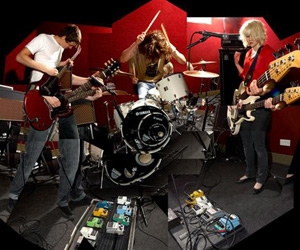So you’re a struggling musician, and you’re looking for a way to raise money toward recording an album or going on tour. In recent years, some of these struggling musicians, and even a few well-known acts, have turned to “crowdfunding” as a way of raising such money—yes, crowdfunding is totally punk rock. While crowdfunding is as grassroots as you can get when trying to raise money from friends, fans and contacts, it can also be troubling if the response isn’t so good.
Yet that hasn’t stopped what has become a crowded house of websites dedicated to crowdfunding from springing up online. Some of those sites have been used to raise money for music-related projects. Here are a few of them in review, beginning with what is perhaps the more popular crowdfunding site for music:
1. Kickstarter.com
Many musical acts, as well as many other creative types, have used Kickstarter to raise money. A fundraising goal is set, as well as a time limit to reach that goal. If the goal is met before the time runs out, the project is funded; if it’s not met in time, no money changes hands.
Over the past summer, female musicians like Julia Nunes, whose videos have been on YouTube since 2006, and Nataly Dawn, of the duo Pomplamoose, have each used Kickstarter to raise more than 5x their intended goals to fund the recording of their albums. Even the husband/wife team of author Neil Gaiman and musician Amanda Palmer—the latter very well-known both as a solo musician and as one-half of the cabaret-punk duo Dresden Dolls—used Kickstarter to raise over $100,000—also 5x their goal—for a West Coast mini-tour set to begin on Halloween 2011 in Los Angeles.
Kickstarter is free to participate, but says that it charges fees for certain services.
2. PledgeMusic.com
While London-based PledgeMusic uses some of the same crowdfunding concepts as Kickstarter, one of its unique propositions is allowing the artists to donate a portion of the proceeds to their favorite charity. One prime example, British rock trio The Subways have used PledgeMusic to raise nearly twice their goal for funding their new album, and are donating 10% of the amount raised in excess of that goal to a British cancer charity.
Like Kickstarter, no money changes hands unless the project reaches its goal. But once that goal is reached, PledgeMusic takes 15% off the top for the amount raised in excess ot it.
Watch the New Video from The Subways ‘We Don’t Need Money To Have A Good Time’
 The Subways: ‘We Don’t Need Money To Have A Good Time’
The Subways: ‘We Don’t Need Money To Have A Good Time’
3. Indiegogo.com
Danae Ringelmann, founder of IndieGoGo, was named one of themost influential women in technology by Fast Company back in 2010. As with many crowdfunding sites, success isn’t guaranteed, but some independent music acts, like the Emily Poe Project from Indianapolis and Jane and the Pretty Pleases from Chicago, are among those who have exceeded their goals by crowdfunding through IndieGoGo.
While free to sign up, IndieGoGo collects a 4% fee if a campaign reaches its goal, but 9% if you don’t, so there’s none of that all-or-nothing standard of fundraising like you find on Kickstarter.
4. FansNextDoor.com
Founded by university students in the Grand Duchy of Luxembourg, FansNextDoor projects cover not only music, but also film, video games, books, and social activities like design, fashion, and even environmental issues. FansNextDoor has charged 3% of what a project raises, if its goal is met, as well as provide services “when it is necessary.” Apparently, though, due to technical issues, it might be free of charge for a limited time.
5. Rockethub.com
In addition to being a website for crowdfunding of music and other creative projects, Rockethub also lets Creatives [the creators] submit “LaunchPad Opportunities” that can be voted on by Facebook “likes,” though the final decision on whether to fund each submission rests on a panel of Rockethub staffers and expert judges. Crowdfunding opportunities are free of charge if successful; fees for LaunchPad Opportunities vary, but can be as much as $5. And Rockethub even gives out virtual badges for both Creatives and Fuelers [the funders].
6. Sellaband.com
This German-based crowdfunding website Sellaband proved to be of great use to veteran rap act Public Enemy. Chuck D, Flavor Flav, and the guys raised over $75,000 through Sellaband last year to record an album.
Like many crowdfunding sites, Sellaband allows artists who use it to provide premiums for Believers [the funders] who fund certain amounts of money toward their projects. Additionally, through Sellaband, an artist can also give a portion of the revenue from any recordings sold back to those Believers. While participation is free, Sellaband does collect a rather high 15% “Success Fee” if the project reaches its fundraising goal.
7. Gigfunder.com
This crowdfunding website is so new to the game, having started just a month or two ago, that their website is in Beta mode as I’m writing this, but the concept behind Gigfunder is one of crowdfunding musicians to play a show in a particular town. According to their introductory blog, fans, not musicians, get to initiate the funding campaigns, and are only charged by Gigfunder if enough money is raised.
Though crowdfunding has been associated with everything from musicians to political campaigns, its implications for funding innovations in the business world, never mind the creative world, have gained the attention of a US Congressional Subcommittee that sees reform of US securities laws as one way to spur even more interest in crowdfunding. As the chairman of the subcommittee put it with respect to that issue, “…America does not lack access to ideas or creativity, it only lacks access to capital.”
Regulatory issues aside, as sure as there is a crowded house of crowdfunding for music-related projects—not just those mentioned here, but others that might be around, or will be, at some point—and there are fans who will go online to contribute financially toward recording an album or going out on tour, don’t dream it’s over for the independent musician.
Crowdfunding—now that’s punk rock.



